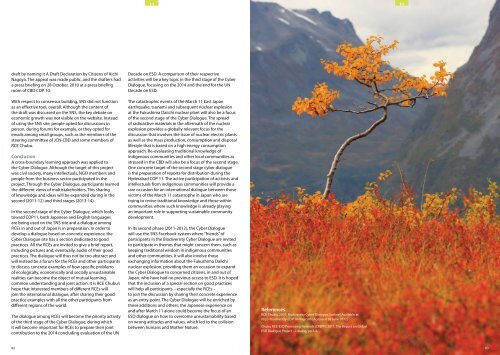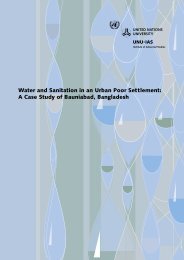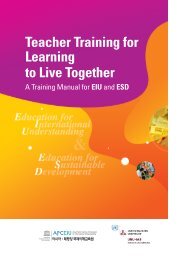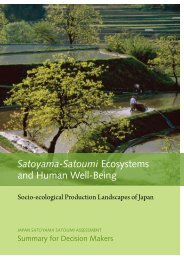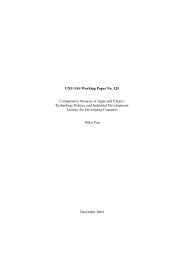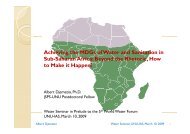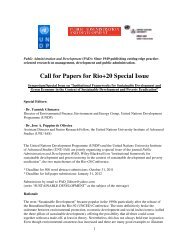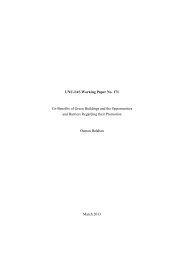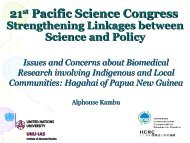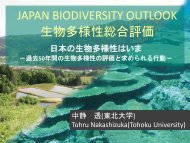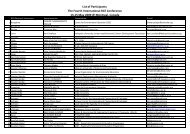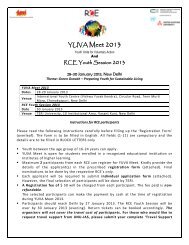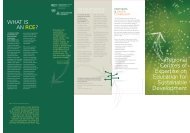TradiTional Knowledge and BiodiversiTy - UNU-IAS - United ...
TradiTional Knowledge and BiodiversiTy - UNU-IAS - United ...
TradiTional Knowledge and BiodiversiTy - UNU-IAS - United ...
Create successful ePaper yourself
Turn your PDF publications into a flip-book with our unique Google optimized e-Paper software.
11<br />
11<br />
draft by naming it A Draft Declaration by Citizens of Aichi<br />
Nagoya. The appeal was made public, <strong>and</strong> the drafters had<br />
a press briefing on 28 October, 2010 at a press briefing<br />
room of CBD COP 10.<br />
With respect to consensus building, SNS did not function<br />
as an effective tool, overall. Although the content of<br />
the draft was discussed on the SNS, the key debate on<br />
economic growth was not visible on the website. Instead<br />
of using the SNS site, people opted for discussions in<br />
person, during forums for example, or they opted for<br />
emails among small groups, such as the members of the<br />
steering committee of JCN-CBD <strong>and</strong> some members of<br />
RCE Chubu.<br />
Conclusion<br />
A cross-boundary learning approach was applied to<br />
the Cyber Dialogue. Although the target of this project<br />
was civil society, many intellectuals, NGO members <strong>and</strong><br />
people from the business sector participated in the<br />
project. Through the Cyber Dialogue, participants learned<br />
the different views of multistakeholders. This sharing<br />
of knowledge <strong>and</strong> ideas will be exp<strong>and</strong>ed during in the<br />
second (2011-12) <strong>and</strong> third stages (2013-14).<br />
In the second stage of the Cyber Dialogue, which looks<br />
toward COP11, both Japanese <strong>and</strong> English languages<br />
are being used on the SNS site <strong>and</strong> a dialogue among<br />
RCEs in <strong>and</strong> out of Japan is in preparation. In order to<br />
develop a dialogue based on concrete experience, the<br />
Cyber Dialogue site has a section dedicated to good<br />
practices. All the RCEs are invited to give a brief report,<br />
including pictures <strong>and</strong>, eventually, audio of their good<br />
practices. The dialogue will thus not be too abstract <strong>and</strong><br />
will instead be a forum for the RCEs <strong>and</strong> other participants<br />
to discuss concrete examples of how specific problems<br />
of ecologically, economically <strong>and</strong> socially unsustainable<br />
realities can become the object of mutual learning,<br />
common underst<strong>and</strong>ing <strong>and</strong> joint action. It is RCE Chubu’s<br />
hope that interested members of different RCEs will<br />
join the international dialogue, after sharing their good<br />
practice examples with all the other participants from<br />
different regions of the world.<br />
The dialogue among RCEs will become the priority activity<br />
of the third stage of the Cyber Dialogue, during which<br />
it will become important for RCEs to prepare their joint<br />
contribution to the 2014 concluding evaluation of the UN<br />
Decade on ESD. A comparison of their respective<br />
activities will be a key topic in the third stage of the Cyber<br />
Dialogue, focusing on the 2014 <strong>and</strong> the end for the UN<br />
Decade on ESD.<br />
The catastrophic events of the March 11 East Japan<br />
earthquake, tsunami <strong>and</strong> subsequent nuclear explosion<br />
at the Fukushima Daiichi nuclear plant will also be a focus<br />
of the second stage of the Cyber Dialogue. The spread<br />
of radioactive materials in the aftermath of the nuclear<br />
explosion provides a globally relevant focus for the<br />
discussion that involves the issue of nuclear electric plants<br />
as well as the mass production, consumption <strong>and</strong> disposal<br />
lifestyle that is based on a high energy consumption<br />
approach. Re-evaluating traditional knowledge of<br />
indigenous communities <strong>and</strong> other local communities as<br />
stressed in the CBD will also be a focus of the second stage.<br />
One concrete target of the second stage cyber dialogue<br />
is the preparation of reports for distribution during the<br />
Hyderabad COP 11. The active participation of activists <strong>and</strong><br />
intellectuals from indigenous communities will provide a<br />
rare occasion for an international dialogue between those<br />
victims of the March 11 catastrophe in Japan who are<br />
trying to revive traditional knowledge <strong>and</strong> those within<br />
communities where such knowledge is already playing<br />
an important role in supporting sustainable community<br />
development.<br />
In its second phase (2011-2012), the Cyber Dialogue<br />
will use the SNS Facebook system where “friends” of<br />
participants in the Biodiversity Cyber Dialogue are invited<br />
to participate in themes that might concern them, such as<br />
keeping traditional wisdom in indigenous communities<br />
<strong>and</strong> other communities. It will also involve those<br />
exchanging information about the Fukushima Daiichi<br />
nuclear explosion, providing them an occasion to exp<strong>and</strong><br />
the Cyber Dialogue to concerned citizens, in <strong>and</strong> out of<br />
Japan, who have had no previous access to ESD. It is hoped<br />
that the inclusion of a special section on good practices<br />
will help all participants – especially the RCEs –<br />
to join the discussion by sharing their concrete experience<br />
as an entry-point. The Cyber Dialogue will be enriched by<br />
these additions <strong>and</strong> others; the Japanese experience on<br />
<strong>and</strong> after March 11 alone could become the focus of an<br />
ESD dialogue on how to overcome unsustainability based<br />
on wrong attitudes <strong>and</strong> values, which led to the collision<br />
between humans <strong>and</strong> Mother Nature.<br />
References<br />
RCE Chubu, 2010. Biodiversity Cyber Dialogue, [online] Available at:<br />
http://biodiversity-COP 10.ning.com [Accessed 26 June 2012]<br />
Chubu RCE-ESD Promoting Network (CREPN) 2011, The Report on Global<br />
ESD Dialogue Project – i-dialog, pp.5-6.<br />
82<br />
83


